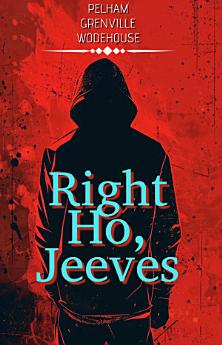Right Ho, Jeeves
নভে ২০২৪ · E-Kitap Projesi & Cheapest Books
ই-বুক
120
পৃষ্ঠা
family_home
উপযুক্ত
info
reportরেটিং ও রিভিউ যাচাই করা হয়নি আরও জানুন
এই ই-বুকের বিষয়ে
Right Ho, Jeeves is a novel by P. G. Wodehouse, the second full-length novel featuring the popular characters Jeeves and Bertie Wooster, after Thank You, Jeeves. It also features a host of other recurring Wodehouse characters, and is mostly set at Brinkley Court, the home of Bertie's Aunt Dahlia. It was first published in the United Kingdom on October 5, 1934 by Herbert Jenkins, London, and in the United States on October 15, 1934 by Little, Brown and Company, Boston, under the title Brinkley Manor. Before being published as a book, it had been sold to the Saturday Evening Post, in which it appeared in serial form from December 23, 1933 to January 27, 1934, and in England in the Grand Magazine from April to September 1934. Wodehouse had already started planning this sequel while working on Thank You, Jeeves. Wodehouse's main canvas remained that of pre-war English upper-class society, reflecting his birth, education, and youthful writing career.An acknowledged master of English prose, Wodehouse has been admired both by contemporaries such as Hilaire Belloc, Evelyn Waugh and Rudyard Kipling and by modern writers such as Douglas Adams, Salman Rushdie, Zadie Smith and Terry Pratchett. Sean O'Casey famously called him "English literature's performing flea", a description that Wodehouse used as the title of a collection of his letters to a friend, Bill Townend.Best known today for the Jeeves and Blandings Castle novels and short stories, Wodehouse was also a playwright and lyricist who was part author and writer of 15 plays and of 250 lyrics for some 30 musical comedies.
লেখক সম্পর্কে
Sir Pelham Grenville Wodehouse, KBE (1881 1975) was a comic writer who enjoyed enormous popular success during a career of more than seventy years and continues to be widely read. Despite the political and social upheavals that occurred during his life, much of which was spent in France and the United States, Wodehouse's main canvas remained that of pre-war English upper-class society, reflecting his birth, education, and youthful writing career. An acknowledged master of English prose, Wodehouse has been admired both by contemporaries such as Hilaire Belloc, Evelyn Waugh and Rudyard Kipling and by modern writers such as Douglas Adams, Salman Rushdie, Zadie Smith and Terry Pratchett. Sean O'Casey famously called him "English literature's performing flea", a description that Wodehouse used as the title of a collection of his letters to a friend, Bill Townend. Best known today for the Jeeves and Blandings Castle novels and short stories, Wodehouse was also a playwright and lyricist who was part author and writer of 15 plays and of 250 lyrics for some 30 musical comedies. He worked with Cole Porter on the musical Anything Goes (1934) and frequently collaborated with Jerome Kern and Guy Bolton. He wrote the lyrics for the hit song "Bill" in Kern's Show Boat (1927), wrote lyrics to Sigmund Romberg's music for the Gershwin - Romberg musical Rosalie (1928), and collaborated with Rudolf Friml on a musical version of The Three Musketeers (1928).
ই-বুকে রেটিং দিন
আপনার মতামত জানান।
পঠন তথ্য
স্মার্টফোন এবং ট্যাবলেট
Android এবং iPad/iPhone এর জন্য Google Play বই অ্যাপ ইনস্টল করুন। এটি আপনার অ্যাকাউন্টের সাথে অটোমেটিক সিঙ্ক হয় ও আপনি অনলাইন বা অফলাইন যাই থাকুন না কেন আপনাকে পড়তে দেয়।
ল্যাপটপ ও কম্পিউটার
Google Play থেকে কেনা অডিওবুক আপনি কম্পিউটারের ওয়েব ব্রাউজারে শুনতে পারেন।
eReader এবং অন্যান্য ডিভাইস
Kobo eReaders-এর মতো e-ink ডিভাইসে পড়তে, আপনাকে একটি ফাইল ডাউনলোড ও আপনার ডিভাইসে ট্রান্সফার করতে হবে। ব্যবহারকারীর উদ্দেশ্যে তৈরি সহায়তা কেন্দ্রতে দেওয়া নির্দেশাবলী অনুসরণ করে যেসব eReader-এ ফাইল পড়া যাবে সেখানে ট্রান্সফার করুন।








